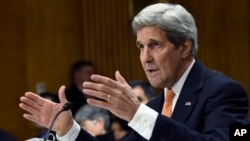The world powers involved in nuclear negotiations with Iran have “halted” the progress of Tehran’s nuclear program, according to Secretary of State John Kerry.
In testimony before a Senate Appropriations subcommittee Tuesday, Kerry said the five permanent members of the United Nations Security Council and Germany, the so-called P5 + 1, had gained “unprecedented insight” into Iran’s nuclear activities.
“We expect to know soon whether Iran is willing to put together an acceptable and verifiable plan,” said Kerry.
Kerry commented a day after returning from Geneva, where he held talks with Iranian Foreign Minister Mohammad Javad Zarif and other officials on a proposed accord limiting Iran's nuclear activities while giving it relief from international sanctions.
Negotiators are trying to reach a framework agreement by the end of March and come to terms on a permanent deal by the end of June to remove concerns about Iran’s ability to develop nuclear weapons.
EU angle
Meanwhile, European Union’s Foreign Policy Chief Federica Mogherini said she is optimistic a deal will be finalized before the March 24 deadline.
“A good deal is at hand, if the parties will keep cooperating, as they did so far, and if we’ll have enough political will on all sides to agree on a good deal and sell it domestically.”
Negotiators have missed two previous deadlines, but officials say it will be difficult to convince skeptics on both sides to accept another extension. The talks are aimed at providing guarantees that Iran will not build a nuclear weapon, and ending international sanctions against it.
Mogherini acknowledged the effort faces opposition in Iran, where officials say their nuclear program is purely peaceful but conservatives don’t want any restrictions on it.
“I’m 100 percent sure about Zarif’s good will, and political will to get a deal. And I would say the same for President [Hassan] Rouhani. But obviously he has, they have, an internal domestic dynamic to be aware of.”
She also noted opposition elsewhere, particularly among some members of the U.S. Congress, who do not trust Iran to abide by an accord.
On Tuesday, Kerry urged them to wait to see what is actually in the deal, if one is reached.
Iranian role in Yemen
During his testimony, Kerry was also asked about Iran’s broader influence in the region.
During a sharp line of questioning, Republican Senator Lindsey Graham pressed Kerry about Iran’s influence in Yemen, Syria and Bahrain.
Asked if Yemen’s government collapsed because of Iran’s backing for the country’s Shi'ite Houthi rebels, Kerry said he believed Iran’s support of the group contributed to Yemen’s collapse, “without any question.”
But Kerry added that Iran has been surprised by the events in Yemen and is hoping for some form of national dialogue there.
Houthi rebels overran Sana’a in September and formally took power this month, after President Abd-Rabbu Mansour Hadi announced he was resigning.
Kerry on Iranian Influence in Syria, Bahrain
Senator Graham also asked Kerry if he believed Syrian President Bashar al-Assad was a “puppet” of the Iranian regime. Kerry replied, “pretty much.”
But in response to a question about Bahrain, Kerry declined to say if he believed Iran was trying to destabilize the country. He said he believed there had been Iranian influence in Bahrain but was not sure of the extent.
The Shi’ite majority opposition in Bahrain has long sought a greater political role from the country's Sunni rulers.
When asked if Iran has been actively trying to produce an Intercontinental Ballistic Missile, Kerry said “that is the subject of a classified conversation.”
Kerry’s answers on Iran and its regional influence were part of his testimony on President Barack Obama’s proposed budget for the State Department for fiscal 2016.
VOA's Al Pessin contributed to this report from London




